Course Spotlight: Sociology of Taste
MET ML 716, Sociology of Taste, with Dr. Connor Fitzmaurice, will be offered as a hybrid class in the spring 2022 semester.
Taste has an undeniable personal immediacy: producing visceral feelings ranging from delight to disgust. As a result, in our everyday lives we tend to think about taste as purely a matter of individual preference. However, for sociologists, our tastes are not only socially meaningful, they are also socially determined, organized, and constructed. This course will introduce students to the variety of questions sociologists have asked about taste. What is a need? Where do preferences come from? What social functions might our tastes serve? Major theoretical perspectives for answering these questions will be considered, examining the influence of societal institutions, status seeking behaviors, internalized dispositions, and systems of meaning on not only what we enjoy--but what we find most revolting.
This course is a graduate level seminar where discussion and class participation are central to student success. As such, this class will feature weekly zoom meetings on Thursday evenings throughout the semester from 6:00 pm to 8:45 pm (with a mid-class break!).
Students will be able to take advantage of three in-person learning opportunities during the spring 2022 semester. During these weeks there will be no Thursday evening Zoom meeting:
- Saturday, March 19, 10 am to 12:45 pm - Project workshop, on campus
- Saturday, April 16th from 11:00 am to 1:00 pm (Rain date April 23rd) - Farm visit
- Saturday, April 30th from 10:00 am to 12:45 pm - Final research presentations, on campus
Opportunities for asynchronous participation will be available via blackboard.
This class is open to graduate students and upper level undergraduates. Non-degree seeking students may register here.
Course Spotlight: Sustainable Food Systems
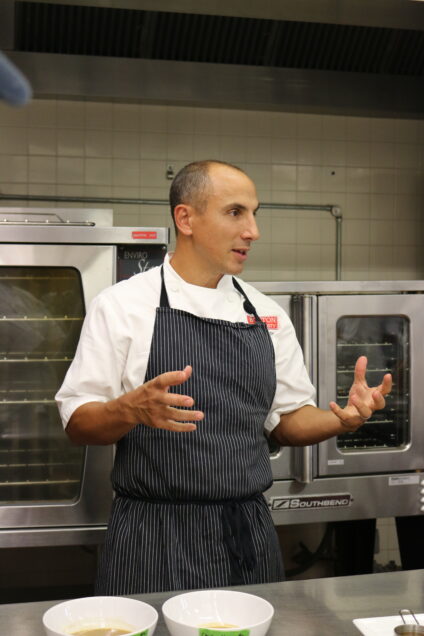 This course will examine the contemporary food system through a multi-disciplinary lens. Taught by Chef Michael Leviton, the course will allow students to put readings and ideas into culinary practice. By examining the often-competing concerns from other domains, including economic (both micro and macro—social), social welfare, social justice and social diversity, health and wellness, food security and insecurity, and resiliency, we can begin to move towards solutions that treat the disease (our food system) and not just the symptoms (domain specific issues). Students will read widely in the topic area, engage in classroom discussion, and work together in the kitchen to understand hands-on culinary approaches to some of the most important issues of our time.
This course will examine the contemporary food system through a multi-disciplinary lens. Taught by Chef Michael Leviton, the course will allow students to put readings and ideas into culinary practice. By examining the often-competing concerns from other domains, including economic (both micro and macro—social), social welfare, social justice and social diversity, health and wellness, food security and insecurity, and resiliency, we can begin to move towards solutions that treat the disease (our food system) and not just the symptoms (domain specific issues). Students will read widely in the topic area, engage in classroom discussion, and work together in the kitchen to understand hands-on culinary approaches to some of the most important issues of our time.
The reading list will be drawn from a wide range of contemporary authors include selections from Michael Pollan's Omnivore's Dilemma, Maryn McKenna’s Big Chicken, Saru Jayaraman‘s Behind the Kitchen Door, and Wenonah Hauter’s Foodopoly . Guest speakers will bring in scholarly and practical approaches being put into use in the contemporary food scene.
Some class meetings will include tastings of different products (different origins, local, heritage, commodity, sustainable, organic, etc.) and cooking instruction around techniques for working with underutilized species, grass-fed (vs grain) beef, pastured vs coop chicken etc.
MET ML 723, Sustainable Food Systems, will meet on Monday nights in the Spring 2022 Semester, beginning on January 23. This class is open to graduate students and upper level undergraduates. Non-degree seeking students may register here.
International Education Week Cookbook Giveaway
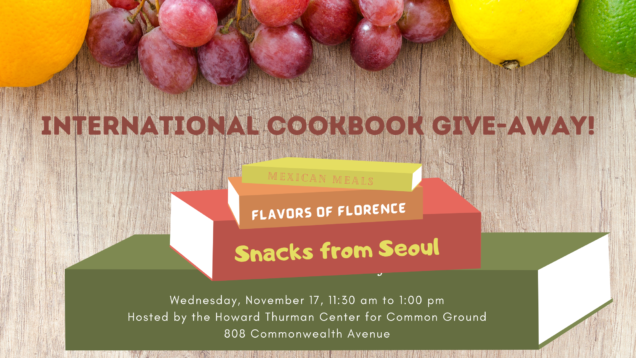
Wednesday, November 17; 11:30 am to 1:00 pm
Howard Thurman Center for Common Ground
Fuller Building, 808 Commonwealth Avenue
As part of BU's International Education Week, Boston University students, faculty, and staff are invited to explore a new cuisine by choosing a free cookbook at this event. We have culled through our collection for duplicates, so you will be helping us make room on our shelves for some additional titles.
Have you ever wondered what books we have in our collection? You can browse through them virtually here, or contact us to arrange a time to visit the library in person.

Fall 2021 Pépin Lecture Series in Food Studies & Gastronomy
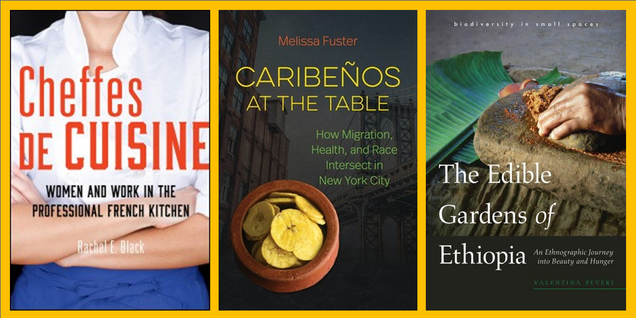
Fall 2020 lectures will be presented in webinar format. Registration is free and open to the public: please follow the link for each program to register.
Cheffes de Cuisine: Women and Work in the Professional French Kitchen
Rachel Black, Associate Professor, Anthropology Department Connecticut College
Though women enter France’s culinary professions at higher rates than ever, men still receive the lion’s share of the major awards and Michelin stars. Rachel E. Black looks at the experiences of women in Lyon to examine issues of gender inequality in France’s culinary industry. Known for its female-led kitchens, Lyon provides a unique setting for understanding the gender divide, as Lyonnais women have played a major role in maintaining the city’s culinary heritage and its status as a center for innovation. Voices from history combine with present-day interviews and participant observation to reveal the strategies women use to navigate male-dominated workplaces or, in many cases, avoid men in kitchens altogether. Black also charts how constraints imposed by French culture minimize the impact of #MeToo and other reform-minded movements.
Evocative and original, Cheffes de Cuisine celebrates the successes of women inside the professional French kitchen and reveals the obstacles women face in the culinary industry and other male-dominated professions.
Cosponsored by the BU Women's, Gender & Sexuality Studies Program
Friday, October 15, noon to 1:00 pm. Register here.
Caribeños at the Table: How Migration, Health, and Race Intersect in New York City
Melissa Fuster, Associate Professor, Tulane University School of Public Health
Melissa Fuster thinks expansively about the multiple meanings of comida, food, from something as simple as a meal to something as complex as one’s identity. She listens intently to the voices of New York City residents with Cuban, Dominican, or Puerto Rican backgrounds, as well as to those of the nutritionists and health professionals who serve them. She argues with sensitivity that the migrants’ health depends not only on food culture but also on important structural factors that underlie their access to food, employment, and high-quality healthcare.
People in Hispanic Caribbean communities in the United States present high rates of obesity, diabetes, and other diet-related diseases, conditions painfully highlighted during the COVID-19 pandemic. Both eaters and dietitians may blame these diseases on the shedding of traditional diets in favor of highly processed foods. Or, conversely, they may blame these on the traditional diets of fatty meat, starchy root vegetables, and rice. Applying a much needed intersectional approach, Fuster shows that nutritionists and eaters often misrepresent, and even racialize or pathologize, a cuisine’s healthfulness or unhealthfulness if they overlook the kinds of economic and racial inequities that exist within the global migration experience.
Cosponsored by the BU Graduate Programs in Nutrition
Friday, November 12, noon to 1:00 pm. Register here.
The Edible Gardens of Ethiopia: An Ethnographic Journey Into Beauty and Hunger - Biodiversity in Small Spaces
Valentina Peveri, Food Anthropologist, American University of Rome
What is a beautiful garden to southern Ethiopian farmers? Anchored in the author's perceptual approach to the people, plants, land, and food, The Edible Gardens of Ethiopia opens a window into the simple beauty and ecological vitality of an ensete garden.
The ensete plant is only one among the many 'unloved' crops that are marginalized and pushed close to disappearance by the advance of farming modernization and monocultural thinking. And yet its human companions, caught in a symbiotic and sensuous dialogue with the plant, still relate to each exemplar as having individual appearance, sensibility, charisma, and taste, as an epiphany of beauty and prosperity, and even believe that the plant can feel pain. Here a different story is recounted of these human-plant communities, one of reciprocal love at times practiced in an act of secrecy. The plot unfolds from the subversive and tasteful dimensions of gardening for subsistence and cooking in the garden of ensete through reflections on the cultural and edible dimensions of biodiversity to embrace hunger and beauty as absorbing aesthetic experiences in small-scale agriculture. Through this story, the reader will enter the material and spiritual world of ensete and contemplate it as a modest yet inspiring example of hope in rapidly deteriorating landscapes.
Based on prolonged engagement with this 'virtuous' plant of southwestern Ethiopia, this book provides a nuanced reading of the ensete ventricosum (avant-)garden and explores how the life in tiny, diverse, and womanly plots offers alternative visions of nature, food policy, and conservation efforts.
Friday, November 19, noon to 1:00 pm. Register here.
New Gastronomy and Food Studies Students, Fall 2021 part 3
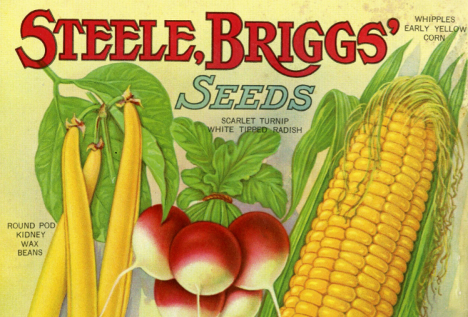
We look forward to welcoming a wonderful group of new students into our programs this fall. Enjoy getting to know a few of them here.
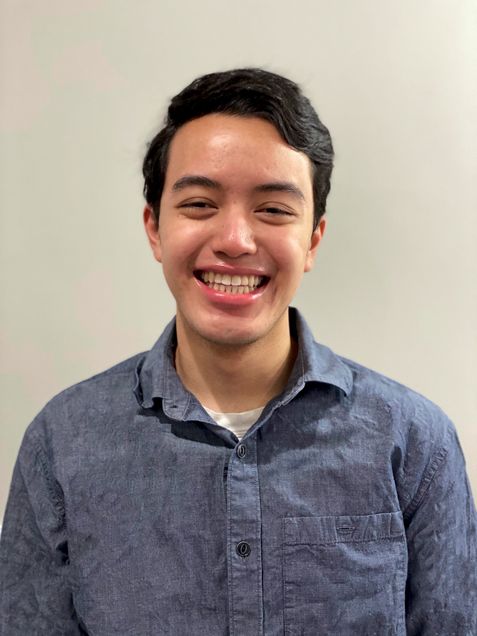 Dedicated to closing the gap of achieving higher education, Melvin Nguyen has served as a College Access Mentor for Breakthrough New York, Let’s Get Ready, and Strive for College to support first-generation low-income BIPOC seniors navigate the complex college application process.
Dedicated to closing the gap of achieving higher education, Melvin Nguyen has served as a College Access Mentor for Breakthrough New York, Let’s Get Ready, and Strive for College to support first-generation low-income BIPOC seniors navigate the complex college application process.
In addition to college access, Melvin is passionate about the power of hands-on learning in kitchen environments, working in restaurants since the age of 14. His time between the foodservice and nonprofit world has shown him the inadequacy of career and technical education in current school systems. His lived experiences have pushed him to become an ardent advocate for vocational learning and classes. As a shift leader and bakery associate at DŌ, Cookie Dough Confections, he leads team members in the daily production of safe-to-eat cookie dough. He has interned at Haley House, a community cafe and soup kitchen for the underserved. He played a key role in spearheading the refresh of catering services for their social enterprise cafe and helping teach healthy and affordable cooking classes to young community members. Recently, Melvin completed two fellowships with the Edwin Gould Foundation Accelerator and Asian Pacific Islander American Scholars Organization.
Melvin graduated from New York University this past May where he majored in Hospitality and Tourism with a concentration in Organizations and Operations and a minor in Food Studies.
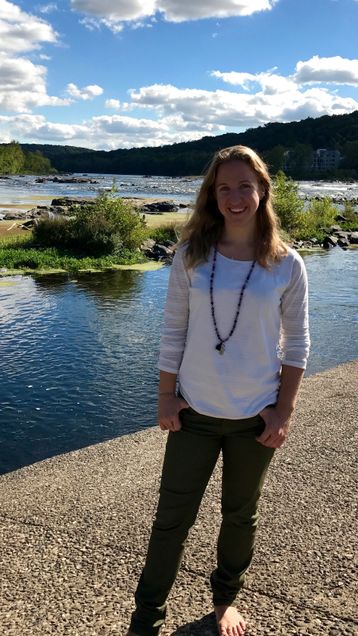
Samantha Schmell is a registered and licensed dietitian whose work is deeply rooted in promoting and protecting community health through food and nutrition, right at the source: the grocery store. Her classes, workshops, and programs are engaging and leave participants inspired to make changes to improve their wellbeing. Samantha’s approach to nutrition focuses on guiding individuals to better cultivate healthy relationships with their food. Her ability to connect with others is her greatest gift. When not talking or eating food, Samantha is a known beekeeper in her community – honey tastings are her equivalent to traditional wine tastings! Samantha is also a registered yoga teacher and has been teaching yoga since 2014. Her goal with the BU Gastronomy program is to further build on her work in the community to cultivate a better understanding of food and all the ways it connects us.
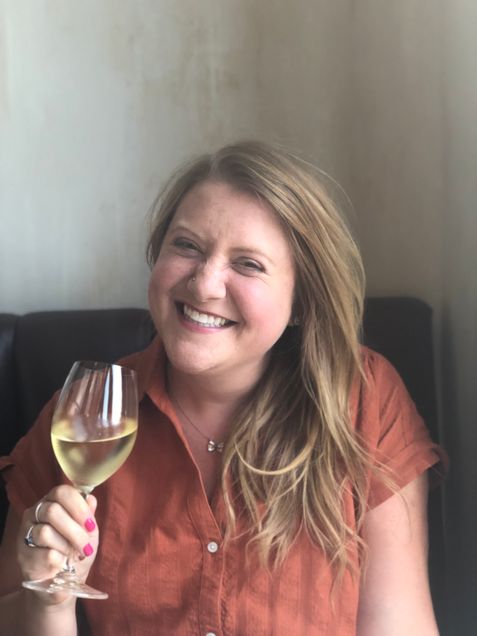 Sarah VanDusseldorp’s kindergarten evaluation said it best: “Sarah asks a lot of questions.” That was true at 5 years old, and it’s still true today. Sarah’s always been curious about everything and the subjects of food and wine allow for endless exploration. Sarah has worked a variety of food jobs - dishwasher, server, bartender, barista, prep cook, baker, expo, host, sommelier, berry picker, corn detasseler, and for one week in 2008, burrito wrapper. Her curiosity draws her to new experiences, new knowledge, and new cuisines. Her curiosity also drives her to collect an outlandish number of cookbooks.
Sarah VanDusseldorp’s kindergarten evaluation said it best: “Sarah asks a lot of questions.” That was true at 5 years old, and it’s still true today. Sarah’s always been curious about everything and the subjects of food and wine allow for endless exploration. Sarah has worked a variety of food jobs - dishwasher, server, bartender, barista, prep cook, baker, expo, host, sommelier, berry picker, corn detasseler, and for one week in 2008, burrito wrapper. Her curiosity draws her to new experiences, new knowledge, and new cuisines. Her curiosity also drives her to collect an outlandish number of cookbooks.
Her year of service with AmeriCorps fundraising for a hunger-relief nonprofit sparked an interest in food justice and equity. Since then, she has worked with food shelves, meal programs, and community gardens throughout the Twin Cities. She is currently a National Fundraising Specialist at American Public Media where she manages fundraising and events for a portfolio of podcasts and national radio shows including the iconic culinary show, The Splendid Table. She’s also on the editorial team of The Vintner Project, an online wine publication focused on the stories of winemakers.
Sarah attended culinary school and has an associate’s degree in applied science from the Le Cordon Bleu Americas and a bachelor’s degree in English and Secondary Education from Hamline University in Saint Paul, MN. She’s completed wine credentials with the Court of Master Sommeliers, the Wine Scholars Guild, and Wine and Spirits Education Trust. In her spare time you can find her baking with too many sprinkles, walking her dogs Applejack and Hank, and reading on her patio with a glass of wine in hand, probably a Rhône varietal.
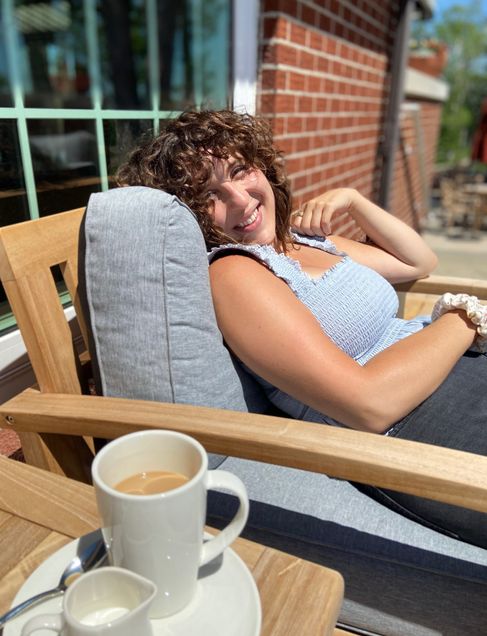 Tillie Loeffelholz: I will be moving to Boston from Seattle where I’ve spent the last six years working in infectious disease research. Since undergrad, I’d been on the path to attend PA school but over time realized that I did not want to move further into the medical field especially because I felt such a longing to work in the food industry. The jump from medicine and clinical research to culinary felt impossible for a long time until the past year during the pandemic when, like a lot of people, I felt more clarity and motivation to take a risk to find more fulfillment in my job.
Tillie Loeffelholz: I will be moving to Boston from Seattle where I’ve spent the last six years working in infectious disease research. Since undergrad, I’d been on the path to attend PA school but over time realized that I did not want to move further into the medical field especially because I felt such a longing to work in the food industry. The jump from medicine and clinical research to culinary felt impossible for a long time until the past year during the pandemic when, like a lot of people, I felt more clarity and motivation to take a risk to find more fulfillment in my job.
After reading about the Gastronomy Master’s Program at BU in an old New York Times article, I was intrigued. I was drawn to the interdisciplinary nature of the program and the variety of paths for which the program might prepare me. I am interested in seeing what inspires me as I move through the program and exploring less traditional careers in the food industry though I haven’t yet ruled out becoming a chef and opening my own restaurant (a dream since childhood.
I decided to quit my job in Seattle in May 2021 and take the summer off to road trip across the country (while applying for school) with the hope that by the time I finished my road trip, I would be on track to start school in September. I’ve spent the last three months driving from Seattle to Iowa to Maine (with a stop to visit Boston) back west to California and now again back to Boston to stay.
I was sitting at my camp on the Colorado River in beautiful Moab on the second to last day of my trip when I found out that I’d been accepted into the program and could not be more thrilled.
New Gastronomy and Food Studies Students, Fall 2021 part 2
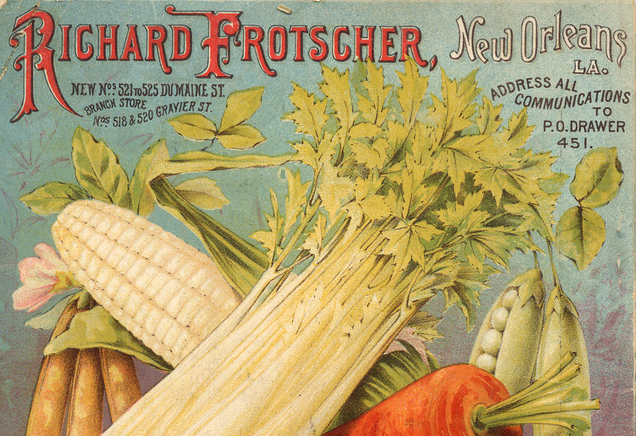
We look forward to welcoming a wonderful group of new students into our programs this fall. Enjoy getting to know a few of them here.
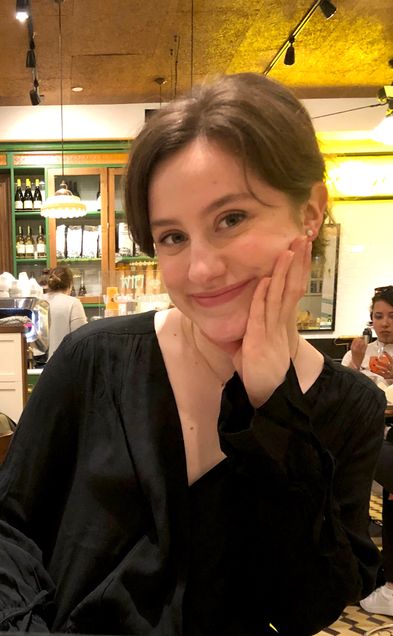 Emma Campbell was raised in a suburb south of Boston and spent almost every Sunday of her childhood going to Sunday dinner at her grandmother’s house. This tradition and the days’ accompanying cooking instruction from her mother and grandmother, reinforced her love of food and cooking. Her grandmother’s recipe box full of handwritten notecards, magazine clippings, and miscellaneous notes remind Emma of food’s significant role in family life and the way in which food informs and evokes memories.Emma graduated from Boston College with a degree in Communication and a minor in American Studies with a concentration in Journalism. After almost three years since undergrad, she sincerely missed the world of academia. When she graduated from BC, she knew she was interested in the Gastronomy Master’s Program at BU and applied after COVID-19 and quarantine reaffirmed the idea that “there is no time like the present.” She hopes to learn more about the context and history of food systems, ingredients, and cooking methods and utilize that knowledge to enrich her life personally, and also prepare her for a future career in the food industry. She currently works at a Boston-based public media station, and spends most of her free time developing recipes and constantly pursuing informal culinary education and instruction. She also enjoys modifying and modernizing family recipes and taste testing them with her partner. She also has a cat named Mačka who will likely choose to introduce herself to Emma’s classmates during lectures on Zoom.
Emma Campbell was raised in a suburb south of Boston and spent almost every Sunday of her childhood going to Sunday dinner at her grandmother’s house. This tradition and the days’ accompanying cooking instruction from her mother and grandmother, reinforced her love of food and cooking. Her grandmother’s recipe box full of handwritten notecards, magazine clippings, and miscellaneous notes remind Emma of food’s significant role in family life and the way in which food informs and evokes memories.Emma graduated from Boston College with a degree in Communication and a minor in American Studies with a concentration in Journalism. After almost three years since undergrad, she sincerely missed the world of academia. When she graduated from BC, she knew she was interested in the Gastronomy Master’s Program at BU and applied after COVID-19 and quarantine reaffirmed the idea that “there is no time like the present.” She hopes to learn more about the context and history of food systems, ingredients, and cooking methods and utilize that knowledge to enrich her life personally, and also prepare her for a future career in the food industry. She currently works at a Boston-based public media station, and spends most of her free time developing recipes and constantly pursuing informal culinary education and instruction. She also enjoys modifying and modernizing family recipes and taste testing them with her partner. She also has a cat named Mačka who will likely choose to introduce herself to Emma’s classmates during lectures on Zoom.
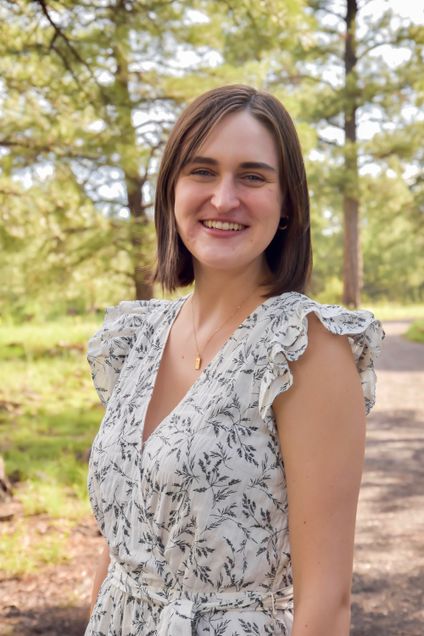 Delainey Rowland’s passion for food began in middle school, when her outside-the- city -limits house in Flagstaff, Arizona finally got cable. Drawn to the Food Network like a moth to a flame, Delainey knew she had found her spark. Once entering high school, Delainey competed in culinary competitions through programs like Careers through Culinary Arts and ProStart and was fortunate enough to become part of a food loving community, which helped her hone her technical and soft skills.
Delainey Rowland’s passion for food began in middle school, when her outside-the- city -limits house in Flagstaff, Arizona finally got cable. Drawn to the Food Network like a moth to a flame, Delainey knew she had found her spark. Once entering high school, Delainey competed in culinary competitions through programs like Careers through Culinary Arts and ProStart and was fortunate enough to become part of a food loving community, which helped her hone her technical and soft skills.
Her love for eating out, trying new things, and connecting with others across a dinner table led her to pursue a bachelor’s degree in Hospitality Management from the University of Nevada, Las Vegas. While at UNLV she studied abroad in Spain and Australia taking food writing and sustainability courses while also indulging in the local cuisine and soaking up everything she could. Upon graduation, the bright lights and everchanging food scene of Sin City captivated her, where she went on to manage several food and beverage outlets in a luxury hotel environment.
While making focaccia and attempting (and failing) to learn to crochet during the Coronavirus lockdown, Delainey stumbled across the Gastronomy program at BU and got that warm fuzzy feeling, like the one when you pull a perfect tray of cookies from the oven. She knew it was time for a change and to pursue something that would encourage creativity.
Delainey is thrilled to make the cross country move to Boston and is looking forward to the seafood, being by the water and meeting other people who get as excited about charcuterie boards as her. Delainey also enjoys backcountry hiking and camping, painting, cheering on the Vegas Golden Knights and spending time with her mom and boyfriend.
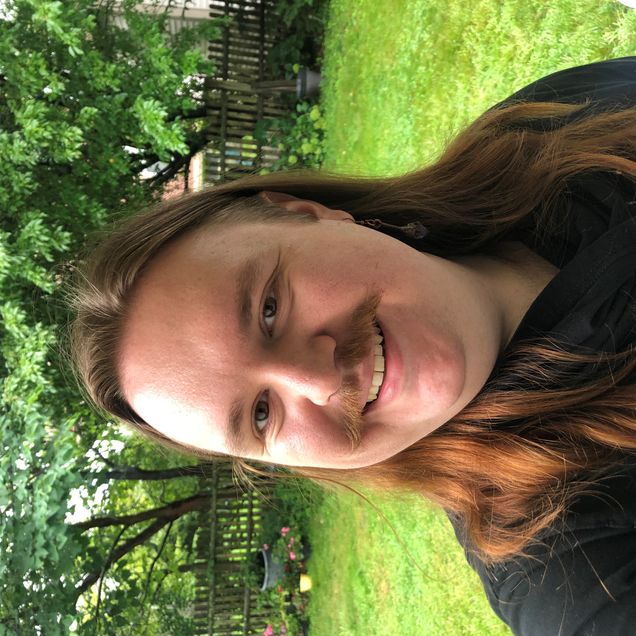 Daniel Wilson is a lifelong New England native, born, raised, and schooled here in Boston. Despite this, his first memorable experience with food was cooking southern style BBQ with his dad and godfather (ironically New Hampshire natives), while competing in local BBQ contests as a teenager. The friendly competitive community, along with the detail and nuance that went into creating the perfect smoked meats, inspired him to learn how to cook on his own.
Daniel Wilson is a lifelong New England native, born, raised, and schooled here in Boston. Despite this, his first memorable experience with food was cooking southern style BBQ with his dad and godfather (ironically New Hampshire natives), while competing in local BBQ contests as a teenager. The friendly competitive community, along with the detail and nuance that went into creating the perfect smoked meats, inspired him to learn how to cook on his own.
While completing his BA in Archaeology from Boston University (2018), Dan created his own independent minor in Food and Culture Studies, giving him opportunities to study food academia across multiple fields and disciplines. After he began working as Academic Program Coordinator at Boston University, he pursued an EdM in Educational Leadership and Policy Studies at Wheelock College (2021), inspired in part by the idea of creating new academic pathways for students, including a Food Studies program for undergraduates. Now he is excited to return back to the liberal arts, and to explore how his policy writing experience gained through working in education can be utilized for both student academic opportunities, as well as for advocating for food justice on a broader scale.
Outside of school and work, Dan is a vocalist who has been performing, touring, and recording with heavy metal bands since 2014. He enjoys writing about topics ranging from seafaring, dark fantasy, as well as themes of social justice and identity. He can often be found cooking for his bandmates and family, gardening with his dad, or starting a new, funky fermentation project.
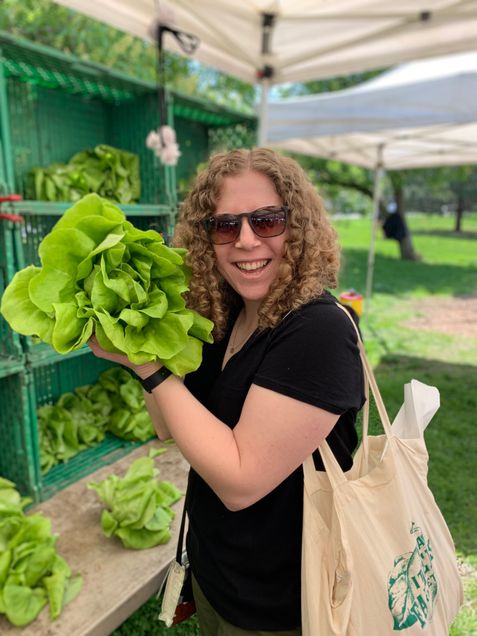 You will most likely find Arielle Dubowe making tahini cookies in her kitchen or talking to people about exotic produce. Hailing from Los Angeles, Arielle feels close ties to this wonderful city full of farmers markets, tacos, and Jewish deli food. She also calls other cities her home, including Chicago, Philadelphia, and now, Boston.
You will most likely find Arielle Dubowe making tahini cookies in her kitchen or talking to people about exotic produce. Hailing from Los Angeles, Arielle feels close ties to this wonderful city full of farmers markets, tacos, and Jewish deli food. She also calls other cities her home, including Chicago, Philadelphia, and now, Boston.
Arielle’s experience with Boston goes all the way back to high school when she spent a summer at Emerson attending a college prep program. She fell in love with the city’s history and fierce loyalty to lobstah rolls and knew she’d be back one day. Growing up in a family of amaetur chefs and foodies, Arielle has always held a reverence for food, especially going out to local restaurants and learning the culture behind specific dishes. She wanted to combine this quest for knowledge with her newfound love for marketing and communications, thanks to the course she took at Emerson. Thus, she went on to pursue her BS in agriculture communication at Cal Poly San Luis Obispo in California.
Through her internships, Arielle has delved into the full spectrum of the food industry—from strategizing with vegetable farmers in upstate New York to delivering Hatch chiles to loyal customers in Southern California to learning about local grains at a bakery in Central California. Upon graduation, she moved to Chicago to begin her career in public relations, working with restaurant clients. After the pandemic hit, Arielle ended her two years in Chicago and went back to L.A., continuing to work remotely while enjoying her grandma’s cooking and eating In-N-Out burgers.
With Julia Child as her role model, it wasn’t hard for Arielle to stumble upon BU’s Gastronomy program and realize this was the best next step for her personal interests and career. With potential aspirations of being an educator, she is humbled to be among everyone else in this program and cannot wait to eat, connect, learn, and grow.
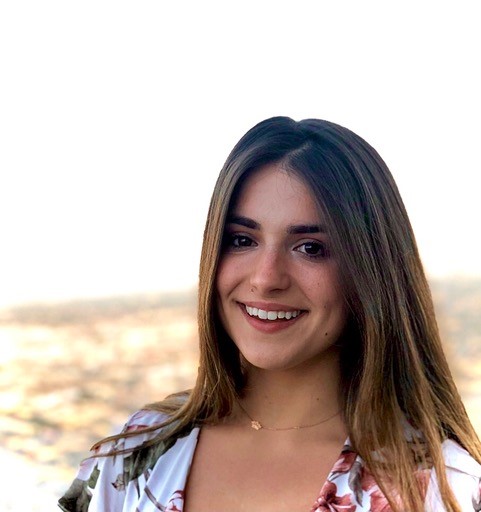 Samantha Torres was born and raised in Miami, Florida and her love for food started at a very young age. Before she could reach the stove, Sam was cooking breakfast for her family every weekend and baking cakes for every special occasion.
Samantha Torres was born and raised in Miami, Florida and her love for food started at a very young age. Before she could reach the stove, Sam was cooking breakfast for her family every weekend and baking cakes for every special occasion.
With a passion for entrepreneurship and a goal to own a bakery of her own one day, Samantha graduated in May 2020 with her bachelor’s in business from the University of Florida with a plan to go to pastry school soon after. Unfortunately, Sam tested positive for COVID-19 that summer, and with it, she lost her sense of smell and taste. Now nearly over a year later, her senses haven’t fully recovered.
Samantha is still eager to be a part of the food industry, just in a different way than initially expected, and hopes to explore her new position in the industry while in the BU Gastronomy program.
Sam first explored one of the many other avenues that exist within the food industry when she worked with a digital food publisher in London. During this time, she learned to look at the industry from a new perspective and was able to explore the role food has on culture and the international aspects of the culinary world. She hopes to continue exploring these ideas and highlight her Cuban culture during her time at BU.
Sam is incredibly excited to move to Boston and start the Gastronomy program this fall. Outside the kitchen, you can find Sam either drawing, painting, or playing with one of her many dogs and cats.
always says that her brother Michael likes to make food (he studied at Ballymaloe Cookery School in Ireland), and she likes to write about food. She is thus a terrible cook, but a great taste-tester for Michael's concoctions and an okay writer.
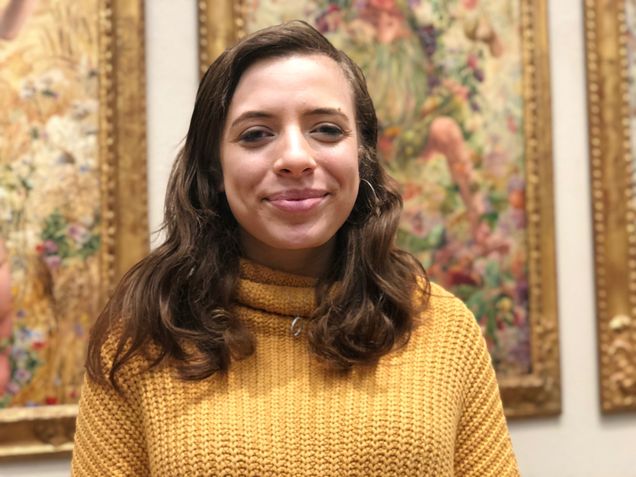 Julia Fine first forayed into food studies at Harvard University, where she explored the food history of the British Empire. Her undergraduate thesis, based on three months of original research at the British Library, investigated the history of the potato in India. However, she wanted to make sure her discussions of food and empire were not divorced from the climate crisis and questions of environmental justice. In response, she pursued an MPhil at University of Cambridge in Modern South Asian Studies, where she wrote her dissertation on the environmental and labor history of salt production in colonial Bengal.
Julia Fine first forayed into food studies at Harvard University, where she explored the food history of the British Empire. Her undergraduate thesis, based on three months of original research at the British Library, investigated the history of the potato in India. However, she wanted to make sure her discussions of food and empire were not divorced from the climate crisis and questions of environmental justice. In response, she pursued an MPhil at University of Cambridge in Modern South Asian Studies, where she wrote her dissertation on the environmental and labor history of salt production in colonial Bengal.
Between her studies, Julia has become involved in DC's exciting food history scene (and she would love to show any fellow Gastronauts around, if they find themselves in the area). She just finished serving as the Project Coordinator for the Folger Shakespeare Library's Before 'Farm to Table': Early Modern Foodways and Cultures Mellon project, and is now affiliated with Dumbarton Oaks' Plant Humanities Mellon Initiative, where she writes about the history of edible plants like turmeric, Carolina rice, and robusta coffee. She is currently very interested in the history of wine, and hopes to eventually write a book on wine, climate change, and climate science.
In her free time, Julia collects vegetarian cookbooks and tries to make her own hot sauce. She is excited to join the community at BU, and is grateful to the James Beard Foundation for supporting her studies.
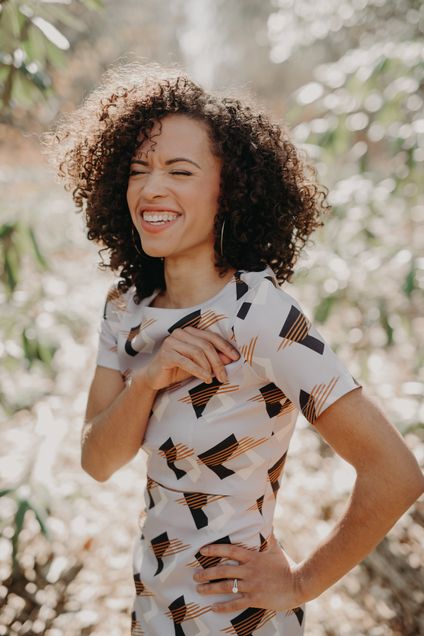 Jessica Ann Vaughn is a passionate person with varied interests that tend to cluster around food, social justice, travel, and culture. In the dozen years since she graduated from NYU with a degree in Media, Culture, and Communications, she’s had a variety of professional experiences across corporate, small business, and solo ventures.
Jessica Ann Vaughn is a passionate person with varied interests that tend to cluster around food, social justice, travel, and culture. In the dozen years since she graduated from NYU with a degree in Media, Culture, and Communications, she’s had a variety of professional experiences across corporate, small business, and solo ventures.
Although her professional and academic experiences have not been centered around gastronomy, the topic of food, and the myriad of ways that it intersects with the economy, public health, the environment, and culture, has become the baseline from which she operates in her waking state. Through her curiosity for the topic of food, Jessica has become the CSA member who seeks to understand the challenges of making a living as a vegetable grower in rural Pennslyvania. She’s the restaurant patron quizzing the well-meaning waitstaff about their ingredient sourcing à la the infamous Colin the Chicken skit from IFC’s Portlandia. She’s the weirdo tourist who can’t leave a foreign city without dragging her travel companions to the local grocery store so that she can peruse the shelves and pick up a reusable tote for her collection back home. She’s the activist informing her friends and family about the staggering number of Americans who live in food-insecure households and redlining’s effect on equitable food access. She’s the home chef who heads to the kitchen to experiment, decompress, and lovingly serve a homemade meal to her family.
Jessica joins the Gastronomy program as an online student based in Eastern Pennslyvania. This past spring she completed a Food Writing course offered through Gotham Writers Workshop as well as BU’s Online Culinary Arts Lab. This program marks the beginning of an in-depth exploration of personal passion that she hopes will lead to a career in food media, food justice, or food business.
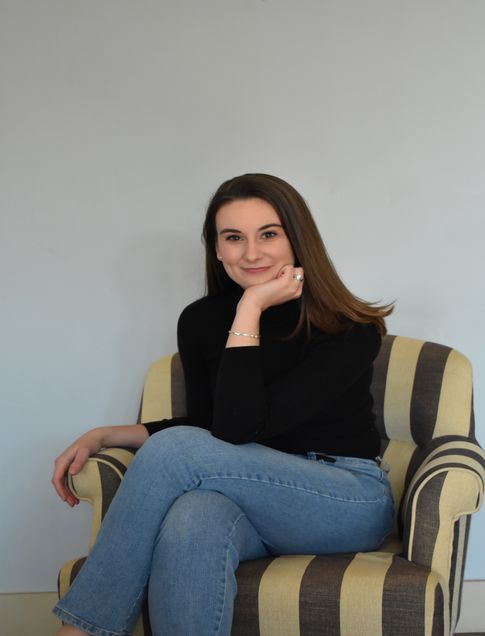 Kristi Rose was born and raised in a town outside of Dallas where she attended a Career and Technical Education high school and participated in the Culinary Arts track. She learned knife skills, was ServSafe certified, catered events, and had the opportunity to plan a restaurant in the ProStart Management Invitational. She had the privilege of experiencing cooking and food as a means of study, gathering, and profit.
Kristi Rose was born and raised in a town outside of Dallas where she attended a Career and Technical Education high school and participated in the Culinary Arts track. She learned knife skills, was ServSafe certified, catered events, and had the opportunity to plan a restaurant in the ProStart Management Invitational. She had the privilege of experiencing cooking and food as a means of study, gathering, and profit.
After Kristi earned her undergraduate degree in business and worked in corporate retail for three years, she had her first pivot and joined Teach for America and moved to Tulsa, OK. This is where she saw first hand how hunger and access to nutritional foods and education impacted the kids in her classroom and portions of the Tulsa community. In her second year, she started a Cooking Club at her school in partnership with Share our Strength's Cooking Matters campaign and the Community Food Bank of Eastern Oklahoma - through this club she experienced some of the most impactful moments as an educator. The kids and parent volunteers connected with food and healthy habits, shared family recipes, and engaged with standards they were learning in their classes in a practical way. With an MLA in Gastronomy, she is hoping to gain the knowledge and skills needed to start her own food business or non-profit organization that actively works to expand food access while simultaneously teaching transferable cooking skills to the community.
Kristi is eager to be experiencing this second life pivot in Boston with her husband, Luke, and their two dogs, Berkeley and Dakota. In her free time she enjoys reading, walking the dogs, and roaming around the city taking it all in!
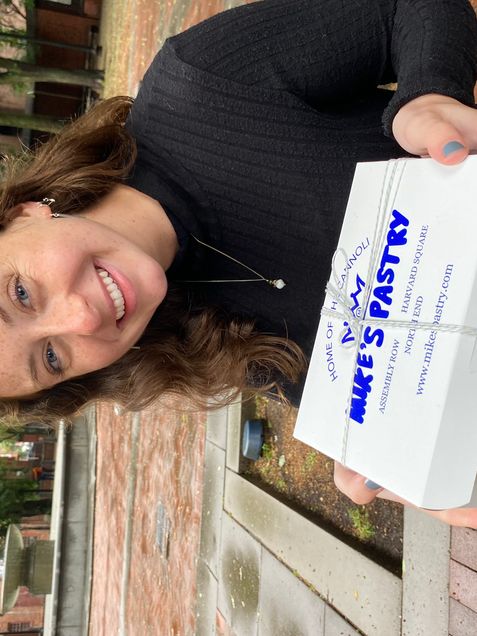 Aurore Kucaba is a recent graduate of the University of Vermont, where she earned a degree focusing on Animal Science. After deciding she did not want to pursue a future as a vet, she began looking into other pathways involving her degree. Aurore had the opportunity to intern with the animal advocacy group Green Mountain Animal Defenders, where she worked to provide more rights towards animals throughout the state of Vermont. Throughout the entirety of her college career, she also worked at multiple restaurants in Burlington, Vermont, where she learned first-hand about the local restaurant scene, and the use of local food vendors. After learning more about how animals were so often exploited in the food industry, she wanted to get more involved in animal justice in the food industry. Although she is neither vegetarian, nor vegan, she believes that a future in which sustainable food is accessible to all, while simultaneously respecting animals is possible.
Aurore Kucaba is a recent graduate of the University of Vermont, where she earned a degree focusing on Animal Science. After deciding she did not want to pursue a future as a vet, she began looking into other pathways involving her degree. Aurore had the opportunity to intern with the animal advocacy group Green Mountain Animal Defenders, where she worked to provide more rights towards animals throughout the state of Vermont. Throughout the entirety of her college career, she also worked at multiple restaurants in Burlington, Vermont, where she learned first-hand about the local restaurant scene, and the use of local food vendors. After learning more about how animals were so often exploited in the food industry, she wanted to get more involved in animal justice in the food industry. Although she is neither vegetarian, nor vegan, she believes that a future in which sustainable food is accessible to all, while simultaneously respecting animals is possible.
During her first summer post-grad, she moved to Boston amidst the Covid-19 pandemic to intern for a local animal law firm. Throughout her summer she grew to love the city of Boston, especially on her weekly donut tours when she was done with work. Aurore then decided to apply for more permanent positions in the city. Surprisingly enough, she got a job working at BU in the 808 building. On her break she happened to stumble upon the Gastronomy program and decided to take a class! After taking two classes, she wanted to commit to the program and pursue a future in Gastronomy. She’s really excited to meet you all this fall! Stop by the 808 Collection Site on campus and say hi!
New Gastronomy and Food Studies Students, Summer and Fall 2021
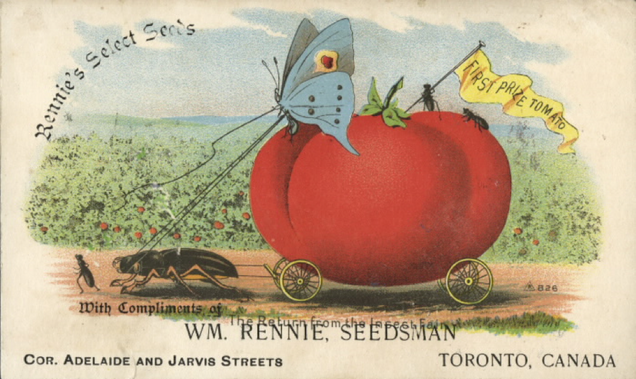
We look forward to welcoming a wonderful group of new students into our programs this fall. Enjoy getting to know a few of them here.
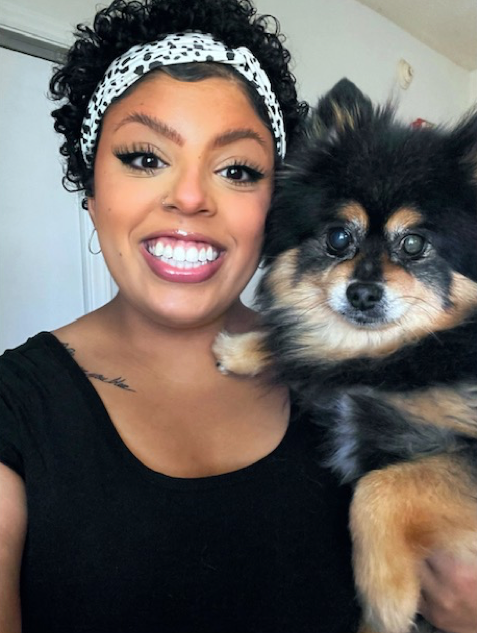 Born and raised in northern Ohio, Michaela Gilgenbach’s love of food and culture developed early on. She spent most of her time engrossed in food shows and making a mess of the kitchen. She made it her duty to attend every food festival every summer where her interest only grew bigger.
Born and raised in northern Ohio, Michaela Gilgenbach’s love of food and culture developed early on. She spent most of her time engrossed in food shows and making a mess of the kitchen. She made it her duty to attend every food festival every summer where her interest only grew bigger.
While completing her undergrad in Spanish and International Studies at Wittenberg University, Michaela began to share her love of food and culture with others. Hosting big family style meals alongside her best friend starting in their tiny dorm room and later on in their apartments.
Even after moving to Tennessee to teach Spanish, Michaela took her love of food and culture with her. She helped host a food club, where students would learn about the process of making certain foods and their history. She would try to master the different cooking styles and expand her knowledge even more during the pandemic. She spent most of her time researching and exploring what new foods she could learn about and make next.
Following her long journey to Boston with her two old pomeranians in June. Michaela is excited to be joining the Gastronomy program starting in the fall. She hopes to continue to learn and grow her love of food. She is thrilled to see where this new journey takes her!
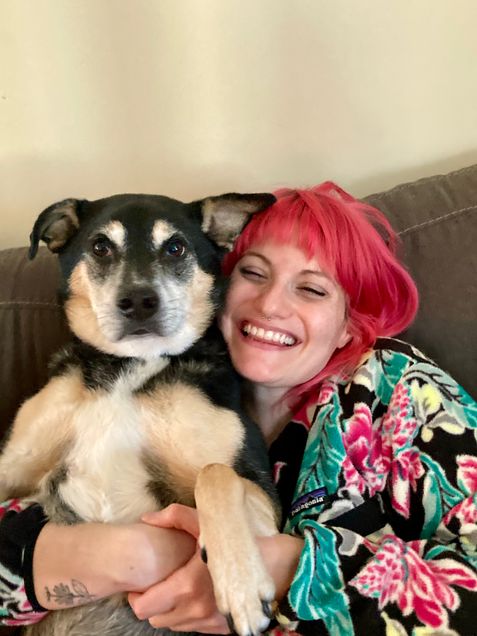 Anna Salzman is a Midwestern transplant originally from Dallas Texas. After graduating from the University of Evansville with a BA in Archaeology without ever having seen an Indiana Jones movie, Anna decided to throw herself straight into the work force. She held various jobs including unloading trucks for retail, giving tours of a still functioning World War II LST, and as a bank teller. While she had mastered her customer service voice and telling others about the importance of revolving credit, she felt the need for a drastic change of pace. Her first taste of farm fresh strawberries at the Bloomington Indiana Farmers’ Market eventually lead her to culinary school in Bloomington. Anna had never baked anything more than simple sugar cookies from scratch before and really had no solid intention of finishing the program. However, thanks to the energy and enthusiasm of her first baking instructor, she graduated and has been working as a pastry chef both in catering and institutional food service. She even went on to become an adjunct chef instructor herself. Making bread baking and pastry cream making (two of Anna’s favorite pastimes) more accessible to a variety of students has been the highlight of her career in food thus far.
Anna Salzman is a Midwestern transplant originally from Dallas Texas. After graduating from the University of Evansville with a BA in Archaeology without ever having seen an Indiana Jones movie, Anna decided to throw herself straight into the work force. She held various jobs including unloading trucks for retail, giving tours of a still functioning World War II LST, and as a bank teller. While she had mastered her customer service voice and telling others about the importance of revolving credit, she felt the need for a drastic change of pace. Her first taste of farm fresh strawberries at the Bloomington Indiana Farmers’ Market eventually lead her to culinary school in Bloomington. Anna had never baked anything more than simple sugar cookies from scratch before and really had no solid intention of finishing the program. However, thanks to the energy and enthusiasm of her first baking instructor, she graduated and has been working as a pastry chef both in catering and institutional food service. She even went on to become an adjunct chef instructor herself. Making bread baking and pastry cream making (two of Anna’s favorite pastimes) more accessible to a variety of students has been the highlight of her career in food thus far.
Anna is pursuing her MA in Gastronomy in the hopes of improving sustainability efforts within institutional food service as well as access to nutrition education.
Anna is beyond excited to move to Boston from the Midwest to experience the culture, food, and New England weather. Her interests outside of food include running, weightlifting, hiking, pretending to be good at indoor rock climbing, and lounging with her fiancé, Jim and dog, Aldo while watching the same episodes of the same sitcoms they have all three seen countless times.
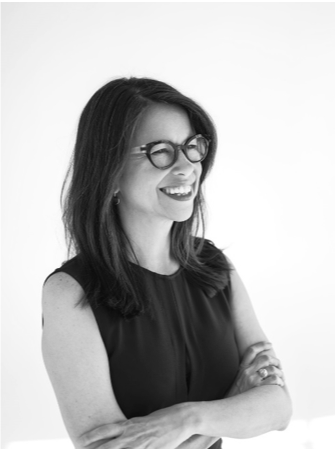 Elsa Underwood began her love affair with food at an early age. Even as a small child, she had an affinity for going to the grocery store and begged her father to take her to the local butcher on Saturday mornings. While traveling and spending time with family in Mexico, every memory is accompanied by the menu. Her childhood home was always just one perfect song away from a full-on fiesta, and food was always the center point around which everyone gathered.
Elsa Underwood began her love affair with food at an early age. Even as a small child, she had an affinity for going to the grocery store and begged her father to take her to the local butcher on Saturday mornings. While traveling and spending time with family in Mexico, every memory is accompanied by the menu. Her childhood home was always just one perfect song away from a full-on fiesta, and food was always the center point around which everyone gathered.
These early experiences inevitably led to a B.S. Degree in Agriculture from Texas A&M University, then a 28-year career in the food industry. Being surrounded by people who think, breathe, and eat food for a living is where she is most comfortable, having worked for food brokers, directly for food manufacturers, and for most of her long career, for H-E-B Grocery Company where she currently serves as Global Sourcing Manager. She has traveled the world and her own backyard, doing business with the largest CPG companies, as well as the smallest of small food entrepreneurs in Texas.
She is confident the gastronomy studies program at BU will satisfy her natural curiosity as well as give her a richer vocabulary with which to express herself. What she hopes to come away with is an even keener understanding of how food can cross cultural and language barriers, so her business connections are not only more productive, they are more enjoyable and long lasting.
Elsa enjoys spending time with her husband of over 30 years, surrounded by friends, family, food, and fun.
Gastronomy Students, Faculty and Alumni to speak at 2021 Food Studies Conference
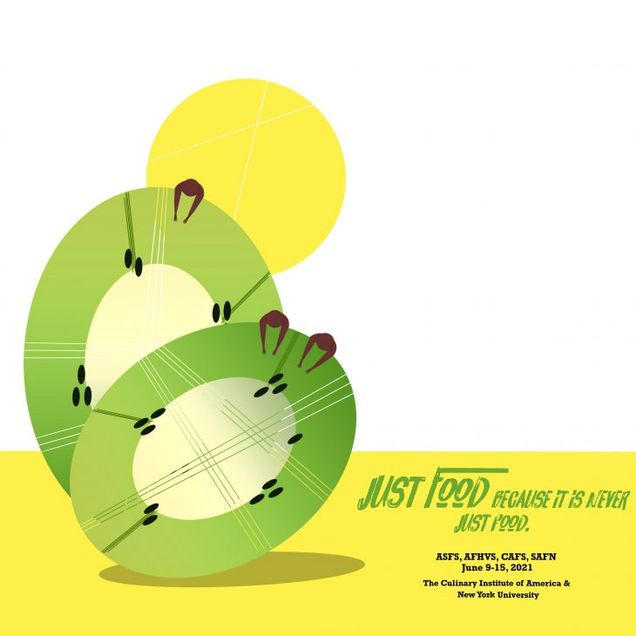
| Just Food: because it is never Just Food, the 2021 Joint Annual Conference of the Association for the Study of Food and Society (ASFS); the Agriculture, Food & Human Values Society (AFHVS); the Canadian Association for Food Studies (CAFS); and the The Society for the Anthropology of Food and Nutrition (SAFN) will run from June 9 to June 15, hosted by the Culinary Institute of America and New York University. |
In this most unusual time, four academic organizations engaged in food studies are hosting a virtual conference centered on the theme of Food Justice. The title, Just Food: because it is never Just Food, highlights how food is ensconced in systems of exclusion, oppression, and power. Papers, presentations and roundtables will grapple with cultural and historical entanglements of food with social justice by examining the production, distribution, and consumption of food while keeping in mind power differentials in local and global world systems. In particular, we have invited submissions that reveal and/or seek to challenge the systemic injustices of the industrial and alternative food systems that marginalize the food histories, practices, and experiences of diverse communities including Indigenous, Black, and people of color. In addition, this conference seeks to highlight the ways people use food for pleasure and autonomy. The conference hopes to make connections between diverse perspectives, to center historically marginalized voices, and to work towards building a greater understanding of how to achieve food justice on Turtle Island (North America) and globally."
Boston University Gastronomy faculty, students and alumni will be presenting in the following conference panels:
Dana Ferrante: June 14th, 9am-10am, 6A3. Roundtable: Disabling Food Scholarship & Activism: Future Prospects at the Intersections of Food Studies and Disability Studies
Jose López Ganem: June 13th, 4:30pm- 6pm, 5E6. Workshop: Mesoamerica, race, and the reminisces of Iberian colonialism through chocolate
Laura Kitchings: June 9th, 9am-10:30am, 1A1. Panel: Cookbooks
Salma Serry: June 10th, 9am-10:30am, 2A1. Panel: (De)Coloniality of Food: Global Cases of Power and Resistance
Hannah Spiegelman & Ariana Gunderson: June 9th & June 14th, 8pm-9:30pm, 1G4 & 6G4. Workshop: Vermouth Storytelling Part 1 & 2
Ariana Gunderson: June 9th, 4:30pm-6pm, 1E3. Panel: Covid Foodways: changing urban food cultures in the coronavirus pandemic
Valerie Ryan: June 15th, 9am-10:30am, 7A3. Panel: Food Pedagogies during and after the pandemic, Part 1 of 2 (Tasting food virtually)
Esther Martin: June 12th, 4:30-6pm, 4E2. Panel: On Whose authority with Whose permission? Authorship, Power, and Privilege in Food media and Art
Kerri LaCharite:
June 9th, 9am-10:30am, 1A4. Roundtable: Staying, Going, or Zooming? The Impact of Covid-19 on Food Studies Abroad
June 10th, 11am-12:30pm, 2B1. Roundtable: Teaching Kitchens: Challenges and Lessons Learned in their Creation, Management, and Operation
June 10th, 8pm-9:30pm, 2G2. Panel: Food System Pedagogy
Katherine Hysmith: June 12th, 4:30pm-6pm, 4E2. Panel: On Whose authority with Whose permission? Authorship, Power, and Privilege in Food media and Art
Megan Elias:
June 9th, 9am-10:30am, 1A3. Roundtable: How to Get Published
June 12th, 11am-12:30pm, 4B2. Roundtable: Listening Session: How Can Food Studies Journals Promote Food Justice?
Netta Davis: June 12th, 9am-10:30am, 4A4. Roundtable: "A Decent and Just Social Order": A Transdisciplinary Conversation on Disability and Food, Part 1 of 2.
Marie-Louise Friedland, Altamash Gaziyani, and Amy Johnson: June 13th, 8pm-9:30pm, 5G4. Workshop: The Curse of Connoisseurship: Othering of Taste in the Beverage Industry
Jared Kaufman, June 14, 9–10:30am, 6A1. Panel: Constructing Taste.
The full conference program is available for download here.
Inside the Art for the Living Landscapes Conference
...And how to get a postcard with the artwork!
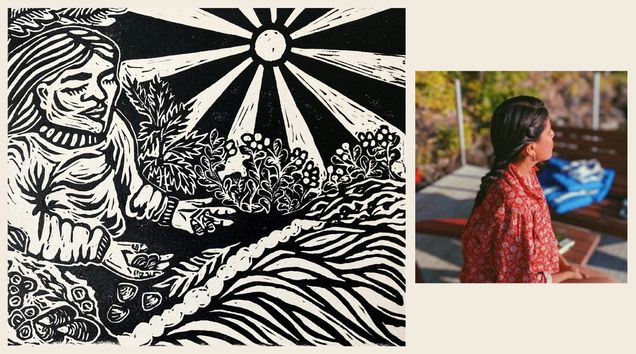
Meet the artist behind our stunning conference art, Kimberly Barzola.
Born and raised on the North Shore of Massachusetts, Kimberly is a first-generation Quechua artist and librarian/archivist in training. Her primary mediums include muralism, relief printmaking, and acrylic painting; some of her vibrant murals can be found in nearby towns of Chelsea and Salem, Mass. Through her work, she responds to the social movements here in the US and across Latin America.

In describing her inspiration for the piece, Kimberly writes, “For this piece I was inspired by my photographs of the New England coastline and in particular, my hometown Salem’s rocky beaches. Cranberries, stinging nettle, barnacles, mussels, acorns, and clams are featured because they are just some of the coast’s wild foods that can be foraged! The earth is so abundant and claims that say otherwise speak to the incredibly wasteful system of production and distribution that prioritize profit and exploitation over ecological alignment and native stewardship of the land. We owe it to the stewards of this land before us and those who will live many generations after us to do everything we can to forcefully and radically take the action needed to align society with earth’s resilient systems.”
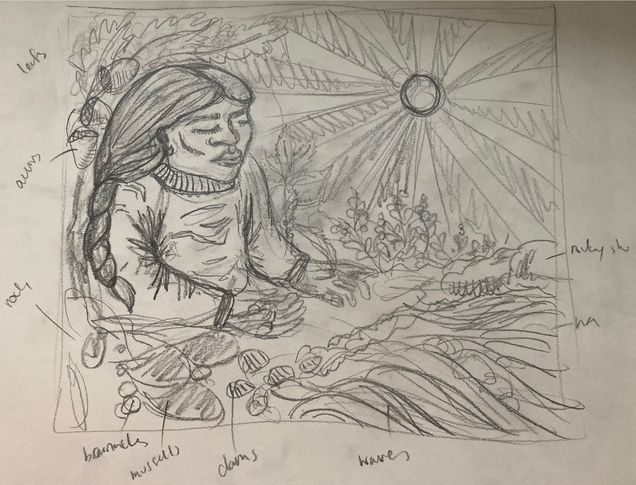
Kimberly’s piece was made through a process called printmaking, in which the artist transfers the sketch onto a piece of linoleum, carves out the negative space by hand, inks the block, and prints the final design onto paper. See Kimberly’s initial sketch for the print below, where she labeled some of the landscapes’ components, including: leaves, acorns, barnacles, mussels, clams, waves, and the rocky shoreline.
In the image below, check out the different local wild and foraged foods in the final image.
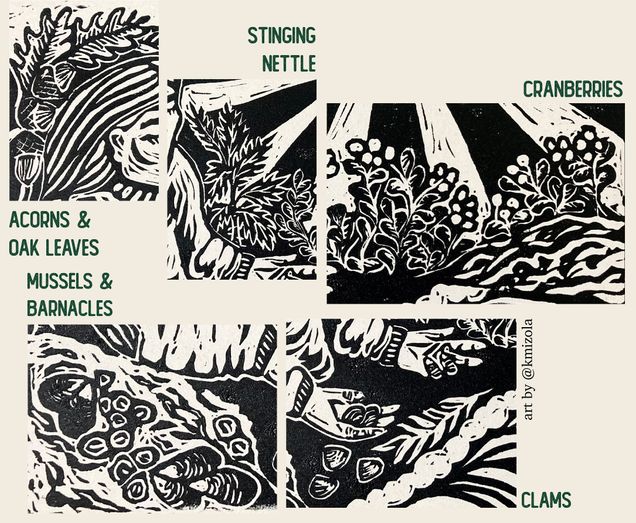
Since we started planning this conference last fall, we knew this conference would be more than a gathering of traditional ‘academic’ speakers. In addition to the uncertainties of COVID, the conference’s focus on the intersections of environmental stewardship and social justice required us to reflect on how to actively center people, voices, ideas, and practices that have traditionally been excluded from ‘the Academy.’
Art is a powerful way to make provoking, transformative ideas tangible, present alternative ways of seeing, and engage a broader audience. We are grateful for Brain Arts Org/Dorchester Art Project—a multi-pronged nonprofit with the mission to realize creative independence in systematically undervalued communities—for connecting us with Kimberly. We are also super grateful for Kimberly’s willingness to not only turn the conference’s broad ideas into a visual reality, but to share her own relationship to the local landscape(s) with all of us.

In thinking about other ways in which we could expand the impact of the conference, we asking folks to make a donation to a community organization upon registering for the Living Landscapes conference. If you can, make a donation and send us your receipt to receive a (snail-mail!) postcard with Kimberly’s awesome artwork on it.
Here’s how it works:
- Register for Living Landscapes.
- Donate any amount to one of the following orgs, many of which were recommended by our speakers:
- Send your receipt and full address to bugastronauts@gmail.com.
- We’ll mail you a postcard!
Living Landscapes:
A Conference Using Foraging to Explore the Intersections of Environmental Stewardship, Racial Justice & Food Sovereignty
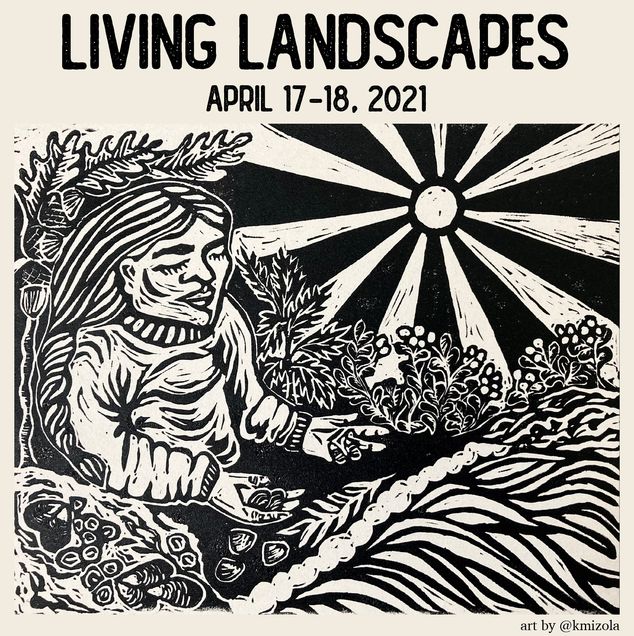
Join the Boston University Gastronomy community for in-depth discussions and (remote) hands-on foraging experiences!
Since the start of the pandemic, the connections between environmental racism, climate change, land (in)access, social justice, and food sovereignty have become clearer than ever.
A pandemic that has killed hundreds of thousands in the US, with Black, Indigenous, and Latinx communities affected at the highest rates. Civil unrest brought on by racialized state violence. Uncontrolled wildfires in the Western US due to climate change and suppression of indigenous land practices; incarcerated individuals forced to put their bodies in harm’s way to battle the fires, while prisons failed to protect them from the coronavirus. Racialized rhetoric that has fanned the flames of violent xenophobia towards AAPI communities, as equally racialized discourse on the “wet markets” in China circulated throughout popular media.
While these phenomena may seem unrelated on a superficial level, these on-going issues can be traced back to the White, settler colonialism notions that shape this country’s understanding of the land and ‘wild’ foods. Living Landscapes was developed with these overlapping issues in mind.
This conference will use foraging as a tangible entry point into the nexus of these issues, bringing together people from a wide variety of backgrounds—including foragers, researchers, and activists—for critical conversations. Through this two-day, virtual micro-conference, we hope to interrogate the landscape(s) of Boston and beyond, and the unequal experiences of those that live, eat, and grow there.
Living Landscapes Conference Program
This conference is free and open to the public. Please register today.
|
Accessibility & Inclusion The BU Gastronomy Program strives to be accessible, inclusive, and diverse in all of our programming. Your experience at this event is important to us! If you have a disability (including but not limited to learning or attention, mental health, concussion, vision, mobility, hearing, physical or other health-related), require communication access services for Deaf or hard of hearing persons, or believe that you require a reasonable accommodation for another reason please contact Dana (dferr@bu.edu) upon registration. |
This event is funded by a BU Diversity & Inclusion Catalyst Grant and BU Sustainability and Innovate@BU Sustainability Innovation Seed Grant. In addition, this event would not be possible without the generous support of the BU Gastronomy Fund, the Gastronomy Program faculty and staff, and the Gastronomy Students Association.
